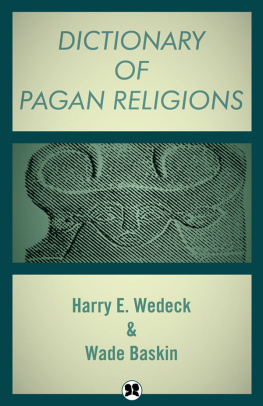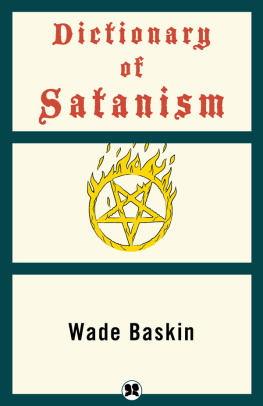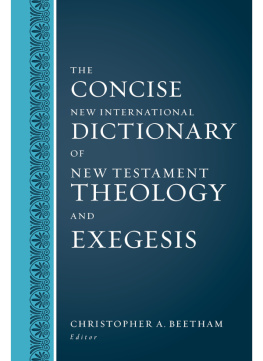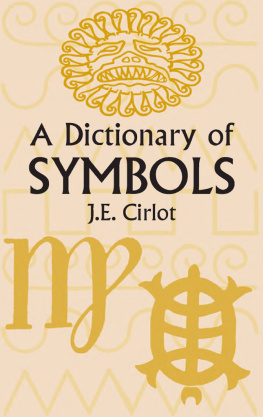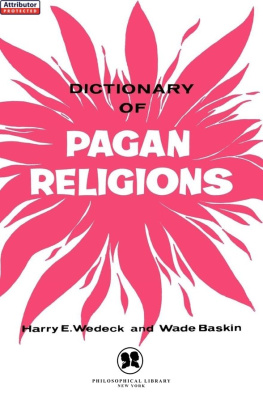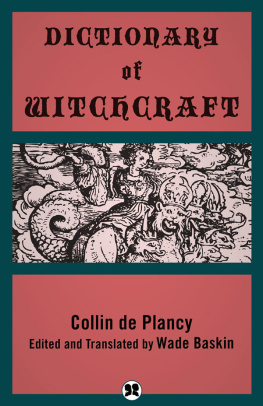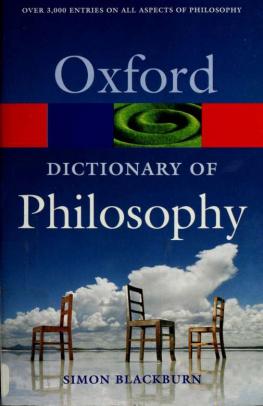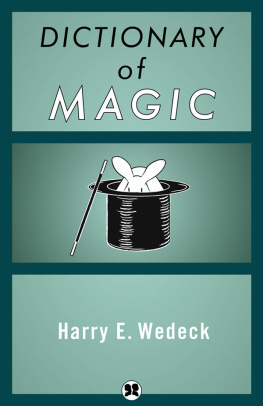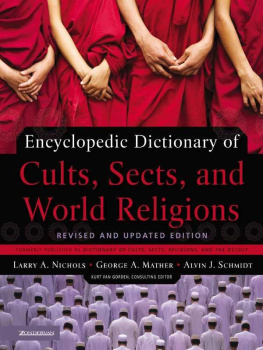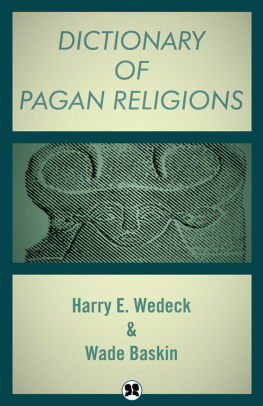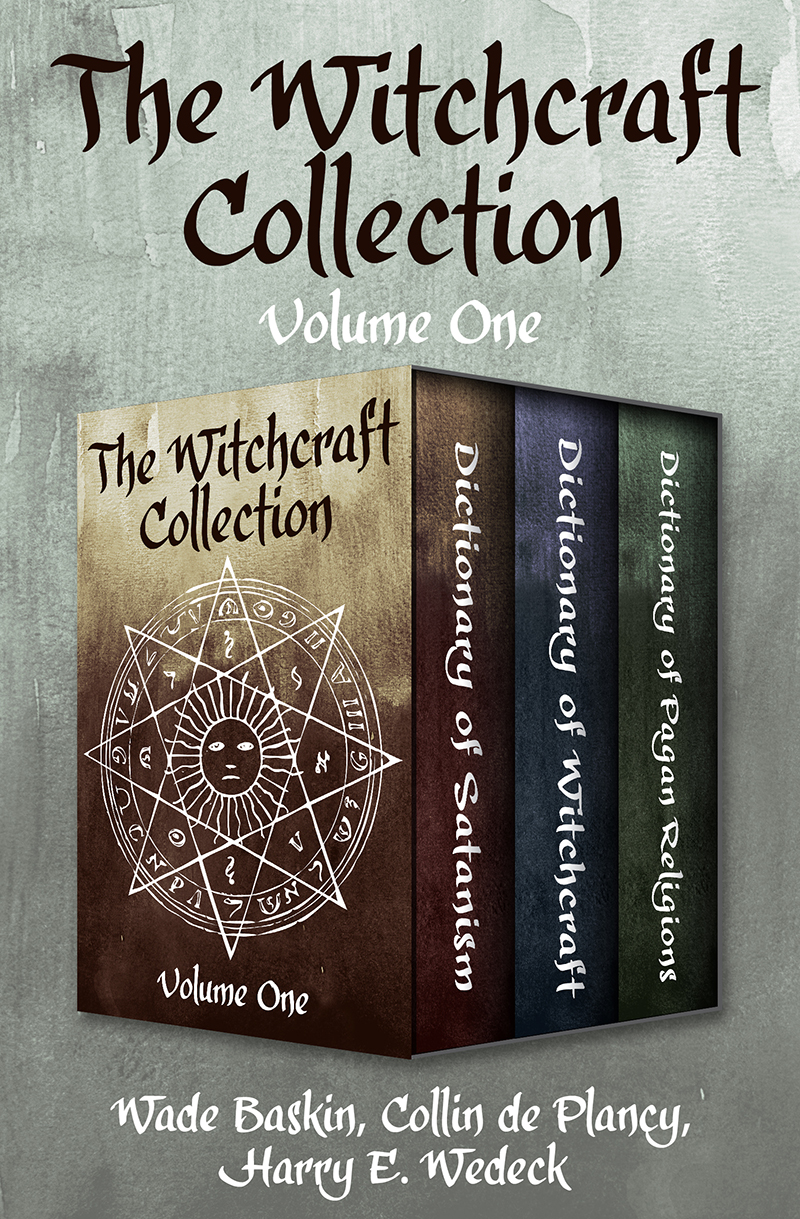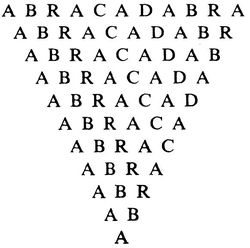The Witchcraft Collection Volume One
Dictionary of Satanism, Dictionary of Witchcraft, Dictionary of Pagan Religions
Wade Baskin, Collin de Plancy, Harry E. Wedeck

CONTENTS
All rights reserved, including without limitation the right to reproduce this ebook or any portion thereof in any form or by any means, whether electronic or mechanical, now known or hereinafter invented, without the express written permission of the publisher.
Dictionary of Satanism Copyright 1972 by Philosophical Library, Inc.
Dictionary of Witchcraft Copyright 1995 by Philosophical Library, Inc.
Dictionary of Pagan Religions Copyright 1971 by Philosophical Library, Inc.
Cover design by Mauricio Daz
ISBN: 978-1-5040-6041-7
Philosophical Library
119 W. 40th Street
New York, NY 10018
www.philosophicallibrary.com

This edition published in 2019 by Open Road Integrated Media, Inc.
180 Maiden Lane
New York, NY 10038
www.openroadmedia.com


Philosophical Librarys mission is to reintroduce readers to books of lasting value by the intellectual icons of the twentieth century, including Albert Einstein, Jean-Paul Sartre, Kahlil Gibran, and Andr Gide.
FIND OUT MORE AT
WWW.PHILOSOPHICALLIBRARY.COM
FOLLOW US:
@PhilLibrary
Facebook.com/PhilosophicalLibrary
PhilosophicalLibrary.Tumblr.com
Philosophical Library is one of a select group of publishing partners of Open Road Integrated Media, Inc.

Find a full list of our authors and
titles at www.openroadmedia.com
FOLLOW US
@OpenRoadMedia





A
A..A... Symbol of the secret society founded by Aleister Crowley and known as the Argentinum Astrum.
AAHLA In Egyptian religion, one division of the Amenti, or lower regions.
AAMON One of the three demons in the service of Satanachia, commander of the first legion of Hell.
AARON Byzantine magician reputed to have possessed the Key of Solomon. He is said to have been an adept in the black arts, commanding legions of demons.
AARON One of the earliest sketches of a medieval Jew (1277) is labeled Aaron fil diaboli. Aaron, son of the Devil.
AARONS ROD A magic wand embellished by a serpent. When cast before the Egyptian Pharaoh, it turned into a serpent.
AATS In Egyptian religion, the domain of the dead was divided into fourteen or fifteen divisions, each called an aat and presided over by a different deity.
ABADDON The leader of the demon locusts described in the ninth chapter of the Book of Revelation. This is the Hebrew name of the Angel of the Bottomless Pit. The meaning of the Hebrew word is the destroyer. In Greek he is identified as Apollyon, the name by which he is called in Pilgrims Progress.
ABADIR A title bestowed by the Carthaginians on their principal deities. In the Punic language, the name means mighty father.
ABARIS A priest of Apollo renowned for his prophetic gifts.
ABASTOR One of the horses of Pluto, god of the underworld in classical mythology.
ABATHAKATHI An African enchanter. See Zulus.
ABATUR In Gnosticism, the father of the Demiurgus, the creator of the world. In occult teachings, he is the third Logos.
ABBA AMONA In the Cabala, the occult names of the two higher sephiroth of the upper triad.
ABBEY OF THELEME Society founded in Sicily, in 1920, by Aleister Crowley. The licentious behavior of its members discredited the society.
ABELLION In Celtic mythology, an important deity. He was identified with the Olympian god Apollo.
ABERDEEN WITCHES A witch-hunting craze that swept over Aberdeen following publication of King James Demonology in 1957 resulted in the burning of twenty-four persons.
ABGURVADEL The magic blade of Icelandic wizardry was used in occult operations.
ABHAMSI In mysticism, the four orders of being: gods, demons, pitris, men.
ABIGOR Demon who commands sixty infernal legions. He appears as a handsome cavalier on a winged horse. He knows the future and all the secrets of war.
AB-I-HAYAT In mysticism, the water of immortality.
ABLANATHANALBA In Gnosticism, a term similar to Abracadabra. It reads the same from either end and was used as a charm in Egypt. It may mean Thou art a father to us.
ABRACADABRA A magic word of unknown origin. It is widely supposed to ward off evil, sickness, and death. Quintus Serenus Sammonicus, who accompanied the Emperor Severus to Britain in the year 208, mentions it in a poem as a cure against tertian fever. Dejae mentions it in his Journal of the Plague Year. Eliphas Levi discusses the magic triangle at length and connects it with other occult concepts, including the symbolism of the Taro. For best results, the word should be arranged in the shape of a triangle and worn around the neck. The word is commonly written:
The word is supposed to be a corruption of the sacred Gnostic term Abraxas, a magic formula meaning Hurt me not.
ABRAHAM THE JEW A German Jew who was at once an alchemist, magician, and philosopher. Born in Mayence in 1362, he is supposed to have learned by word of mouth secrets transmitted by the Egyptian occultists, particularly Abramelin.

